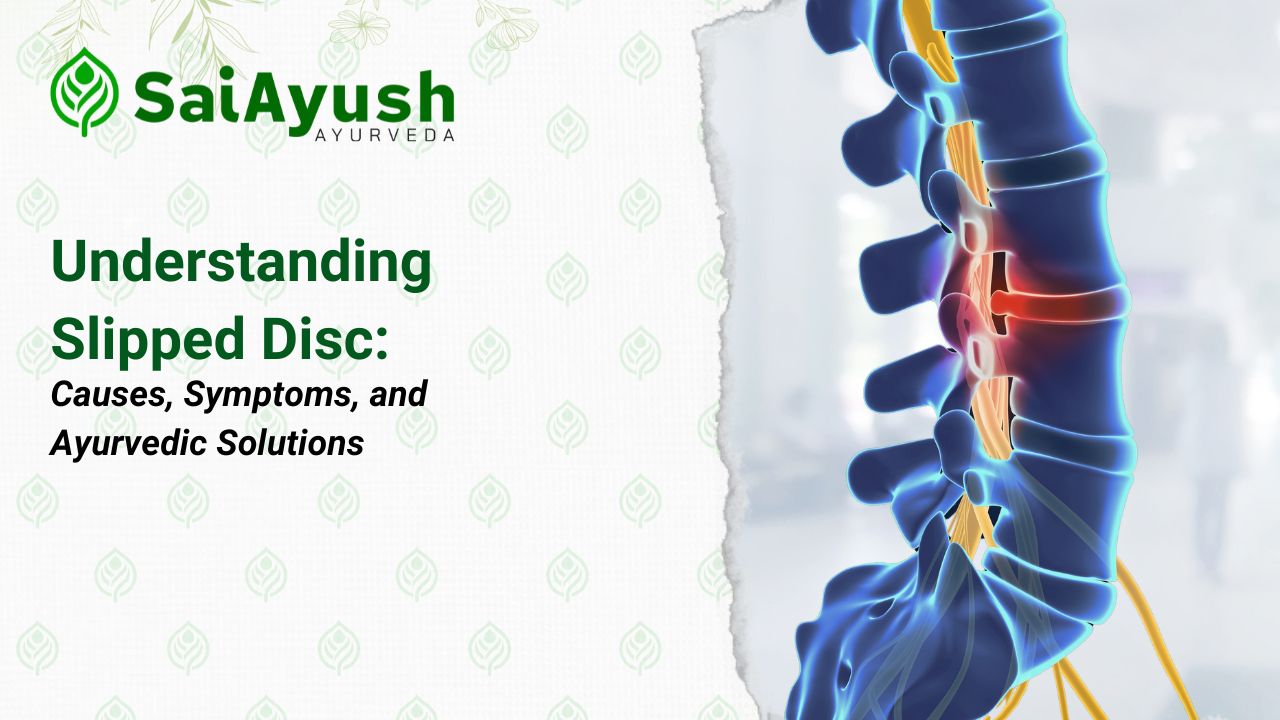Have you ever felt a sharp pain in your back or neck that just won’t go away? It might be a slipped disc. In this post, I’ll explain what a slipped disc is, its causes, signs and symptoms, and how Ayurveda can offer effective treatments and preventive measures. Let’s dive into the world of spinal health with a friendly, approachable guide that aims to alleviate your discomfort and bring you back to full mobility.
What is a Slipped Disc?
A slipped disc, also known as a herniated disc, occurs when the soft, gel-like center of a spinal disc pushes through a crack in its tougher exterior casing. This condition can irritate nearby nerves, leading to pain, numbness, or weakness in an arm or leg. It commonly affects the lower back but can also impact the neck.
What Causes a Slipped Disc?
Several factors can contribute to the development of a slipped disc, including:
- Aging: The discs lose water content and flexibility, making them more prone to rupturing.
- Weight: Excess body weight puts additional stress on the discs.
- Injury: Sudden movements or heavy lifting can cause a disc to slip out of place.
- Genetics: Some people inherit a predisposition to developing a slipped disc.
- Sedentary Lifestyle: Lack of physical activity weakens the muscles that support the spine.
Signs and Symptoms of a Slipped Disc
Recognizing the signs and symptoms of a slipped disc is crucial for timely treatment. Common symptoms include:
- Pain and Numbness: Usually on one side of the body.
- Radiating Pain: Pain that spreads to your arms or legs. For instance, a slipped disc in the lower back can cause pain in the buttocks, thigh, and calf, while one in the neck can cause shoulder and arm pain.
- Pain that Worsens with Movement: Activities like coughing, sneezing, or sitting can intensify the pain.
- Muscle Weakness: Affected muscles may become weak, leading to difficulty in lifting or holding items.
Ayurvedic Perspective on Slipped Disc
Ayurveda, the ancient Indian system of medicine, views a slipped disc as a condition caused by an imbalance in the body’s doshas—Vata, Pitta, and Kapha. This imbalance disrupts the natural harmony and functioning of the spine, leading to pain and discomfort.
Ayurvedic Treatments for Slipped Disc
Treatments in Ayurveda
Ayurveda offers a holistic approach to treating a slipped disc, emphasizing the restoration of balance through diet, lifestyle changes, herbal remedies, and specific therapies. Here are some effective Ayurvedic treatments:
Panchakarma Therapy
Panchakarma is a detoxification process that includes:
- Virechana (Purgation Therapy): Helps cleanse the body of toxins.
- Basti (Enema Therapy): Alleviates Vata imbalance, often the root cause of slipped discs.
- Abhyanga (Oil Massage): Relaxes muscles and relieves pain.
Herbal Remedies
Ayurveda utilizes various herbs to treat a slipped disc, such as:
- Shallaki (Boswellia Serrata): Known for its anti-inflammatory properties.
- Guggulu (Commiphora Mukul): Reduces pain and inflammation.
Preventive Measures for Slipped Disc
What Are the Preventive Measures?
Preventing a slipped disc involves adopting healthy lifestyle habits and being mindful of your body mechanics:
- Regular Exercise: Strengthens the muscles supporting your spine. Focus on core-strengthening exercises.
- Proper Lifting Techniques: Avoid bending at the waist; instead, bend your knees and lift with your legs.
- Maintain a Healthy Weight: Reduces stress on your spine.
- Good Posture: Keep your back straight and aligned, especially when sitting for long periods.
- Ergonomic Workstation: Ensure your workspace supports good posture and minimizes strain on your back.
Understanding a slipped disc, recognizing its symptoms, and exploring Ayurvedic treatments and preventive measures can help you manage this condition effectively. By integrating Ayurvedic principles into your daily routine, you can alleviate pain and promote overall health and well-being.
FAQs
Q1: What is a slipped disc?
A: A slipped disc, or herniated disc, occurs when the inner gel-like core of a spinal disc pushes out through a tear in the outer layer, often causing pain and discomfort.
Q2: What are the symptoms of a slipped disc?
A: Symptoms include pain, numbness, muscle weakness, and pain that radiates to arms or legs, depending on the location of the herniated disc.
Q3: What causes a slipped disc?
A: Causes include aging, excess weight, injury, genetic predisposition, and a sedentary lifestyle.
Q4: How does Ayurveda treat a slipped disc?
A: Ayurveda treats a slipped disc through therapies like Panchakarma, herbal remedies, and lifestyle modifications tailored to the individual’s body constitution and dosha imbalances.
Q5: How can I prevent a slipped disc?
A: Preventive measures include regular exercise, proper lifting techniques, maintaining a healthy weight, good posture, and using ergonomic workstations.
Discover the healing power of Ayurveda with our latest article at Sai Ayush Ayurveda Hospitals! Dive into the age-old wisdom that can rejuvenate your body and mind. Click here to read more:



0 Comments